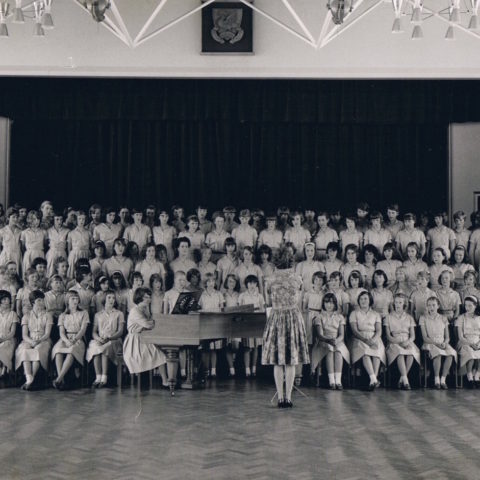 Winifred Egan’s testimonial in 1961 from the headmistress of Wellington Secondary (Modern) School for Girls in Cheshire, England, states that Winifred was ‘a capable teacher … who … closely linked the teaching of Housecraft with Science’. This situates Winifred (1915-2007) within a tradition of domestic subjects teaching that had been the focus of debate during the nineteenth and twentieth centuries about what constituted an appropriate ‘domestic’ and ‘scientific’ education for women and girls. They also resonated within the development of household science for women, epitomised by the foundation in London in 1928 of Kings College for Household and Social Science, from where Winifred graduated BSc (Household and Social Science) in 1936. Her course at Kings concentrated on a core of sciences relevant to the domestic sphere – chemistry, biology, physiology, bacteriology and hygiene. in the first year of the course the work in inorganic chemistry was ‘practically the same as that of an ordinary Intermediate BSc course’. In the third year of her course, the book written by her lecturers noted:
Winifred Egan’s testimonial in 1961 from the headmistress of Wellington Secondary (Modern) School for Girls in Cheshire, England, states that Winifred was ‘a capable teacher … who … closely linked the teaching of Housecraft with Science’. This situates Winifred (1915-2007) within a tradition of domestic subjects teaching that had been the focus of debate during the nineteenth and twentieth centuries about what constituted an appropriate ‘domestic’ and ‘scientific’ education for women and girls. They also resonated within the development of household science for women, epitomised by the foundation in London in 1928 of Kings College for Household and Social Science, from where Winifred graduated BSc (Household and Social Science) in 1936. Her course at Kings concentrated on a core of sciences relevant to the domestic sphere – chemistry, biology, physiology, bacteriology and hygiene. in the first year of the course the work in inorganic chemistry was ‘practically the same as that of an ordinary Intermediate BSc course’. In the third year of her course, the book written by her lecturers noted:
In some cases the experiments deal more particularly with problems relating to household matters, and are not performed in the Chemical Laboratory, but form part of the work in the Kitchen Laboratory. This work is carried out in conjunction with the work in Applied Chemistry to meet the special needs of students of Household Science (Tinkler and Masters, Applied Chemistry: A Practical Handbook for Students of Household Science and Public Health. Volume 2 Foods (London: The Technical Press, 1926), p.vi
During the inter-war period Kings College of Household Science developed a strong emphasis on nutrition and dietetics as a branch of household science, along with the comparatively new science of bacteriology. As a prospective teacher she also took vacation courses in needlework (at the Royal School of Needlework) and in food preservation before undertaking teacher training at the Manchester School of Domestic Economy.
As a graduate, Winifred was unusual in working in the state elementary sector. Her first post was at Trafalgar Square Cookery Centre in the Mile End Road in the East End of London, where girls aged 11 to14 attended from surrounding schools. Having been evacuated with Trafalgar Road School she gave food demonstrations to mothers of schoolchildren and local Women’s Institutes, and teaching at Sale Girls’ High School in 1940 (and later at Liverpool’s Fanny Calder College) she juggled rationing in her cookery teaching. In 1944 Winifred moved to Liverpool’s City Technical School for Women / F.L. Calder College of Domestic Science, where she lectured on dietetics, cookery and housewifery, trained first year students in practical demonstrations prior to their practical teaching in schools, and engaged with local schools and local works canteens.
For more on Winifred’s life and work see
Bridget Egan and Joyce Goodman. “Household and Domestic Science: Entangling the Personal and the Professional.” History of Education 46, no.2 (2016): 176-91
All blog posts are my copyright and may not be reproduced in any medium without my permission and full acknowledgement. You are welcome to cite or quote from the material on the site provided you acknowledge the source fully.
